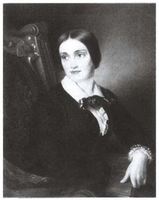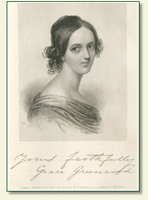Greenwood's "Notes from over the Sea," New York Times, Dec 9, 1878
Dublin Core
Title
Greenwood's "Notes from over the Sea," New York Times, Dec 9, 1878
Subject
Lippincott, Sara Jane (pseudonym: Grace Greenwood), 1832-1904
Actors and Actresses--US American
Actors and Actresses--French
Criticism
Praise
Social Events--Misc.
Social Events--Travels
Travel Reports
France--Paris
Description
This note is written in Paris on Nov 21, 1878. Greenwood reports her experiences during a fair in Paris and criticizes one of Sarah Bernhardt's roles on stage, which she compares with Charlotte Cushman's Meg Merilies.
Creator
Lippincott, Sara Jane (pseudonym: Grace Greenwood), 1832-1904
Source
Publisher
H.J. Raymond & Co.
Date
1878-12-09
Type
Reference
Article Item Type Metadata
Text
It is a month to-day since that grand international love-feast, the fete of the Distribution of Prizes--an occasion now as much a part of French history as that famous meeting and palaver of Princes and potentates held on the Field of the Cloth of Gold 360 years ago. [...] A crowd of well-dressed intelligent-looking promenaders soon turned their eyes from the lofty contemplation of such an anomalous course, such an audacious hurdle-race among the clouds, to watch a set of Italian marionettes dancing on a mimic stage; and so they passed, like so many wild pigeons, lessening in the distance and fading in the twilight, going out with the day. [...]
Our last visit was paid on that dreary closing day of the Exposition. We found the brother quietly telling their strange story--old to them, from much iteration, to a few solemn strangers, and seeming cheerful, if not jolly, under the "circumstances" of dull times and a greater lack of appreciation than they had looked for here. The French are not a maritime people, nor a really venturous; they not only do not know, the vast majority of them, what an ocean voyage is, but they do not understand, they can scarcely believe in, a bold and hardy enterprise of this sort. English people have been the most interested and sympathetic visitors. Next to a lord they adore "pluck." But Americans have not, I think, done justice to this miraculous little craft, compared with which the poor old Mayflower and the Spanish tub which carried Columbus from Palos to San Salvador, were vessely mighty, and stanch and royally appointed. To me there was nothing in the great Exhibition more wonderful than this same little boat, which the "multidinous seas" had tossed from one to another like a frail toy for 3,000 miles, which the leviathans had grazed, and the watchful hsarks looked into, and the shy, but no longer mythical, sea-serpent disported about. [...]
Among the last entertainment of Exposition time was the revival at the Francais of "The Sphinx," with Mlles. Croizette and Bernhardt, and MM. Worms. Febvre, and Coquelin in the leading parts. [...] I am inclined to believe that Sara Bernhardt is the finest, if not the grandest, actress on the stage to-day, and one of the most extraordinary women living. She is called "the second Rachel." but she is not much like the great Jewess, except in her exquisite voice and the serpentine grace of her movements. She has less fire and force, but more heart; she has fewer jewels and more friends; she has not turned her tears into diamonds or her blood into rubies. [...] It is true, she made up a very unpleasant face by smearing it with some sort of powder in her hands and by crossing her eyes. Then she clutched at her throat, tore open the breast of her riding habit, put her hands on her stomach, and bent nearly double, crying out hoarsely, then fell back on her chair, and died on the instant; with her riding-boots and the footlights--a horribly ugly. but not to me an impressive or a really terrible sight. Charlotte Cushman's death as Meg Merrilies was far finer, and there was more of it. It seems that on the first night of the revival this scene was given in the old elaborate manner, which ws awfully great in its way, and that the critics, grown fastidious, clamored against it as too revoltingly realistic. It seems, too, that the classic Francais has decided that it wants but little on its boards of such vulgar agony as attends death by strychnine, "nor wants that little long." They even talk of suppressing the fearful scene altogether, and letting poor Blanche take her "cup of cold pizen" quietly and decorously in her chamber, which, with Croizette's unfortunate engraissment will lead to the final withdrawal of "The Sphinx," for "The Sphinx" was Croizette, and Croizette dying, and dying a great deal.
Our last visit was paid on that dreary closing day of the Exposition. We found the brother quietly telling their strange story--old to them, from much iteration, to a few solemn strangers, and seeming cheerful, if not jolly, under the "circumstances" of dull times and a greater lack of appreciation than they had looked for here. The French are not a maritime people, nor a really venturous; they not only do not know, the vast majority of them, what an ocean voyage is, but they do not understand, they can scarcely believe in, a bold and hardy enterprise of this sort. English people have been the most interested and sympathetic visitors. Next to a lord they adore "pluck." But Americans have not, I think, done justice to this miraculous little craft, compared with which the poor old Mayflower and the Spanish tub which carried Columbus from Palos to San Salvador, were vessely mighty, and stanch and royally appointed. To me there was nothing in the great Exhibition more wonderful than this same little boat, which the "multidinous seas" had tossed from one to another like a frail toy for 3,000 miles, which the leviathans had grazed, and the watchful hsarks looked into, and the shy, but no longer mythical, sea-serpent disported about. [...]
Among the last entertainment of Exposition time was the revival at the Francais of "The Sphinx," with Mlles. Croizette and Bernhardt, and MM. Worms. Febvre, and Coquelin in the leading parts. [...] I am inclined to believe that Sara Bernhardt is the finest, if not the grandest, actress on the stage to-day, and one of the most extraordinary women living. She is called "the second Rachel." but she is not much like the great Jewess, except in her exquisite voice and the serpentine grace of her movements. She has less fire and force, but more heart; she has fewer jewels and more friends; she has not turned her tears into diamonds or her blood into rubies. [...] It is true, she made up a very unpleasant face by smearing it with some sort of powder in her hands and by crossing her eyes. Then she clutched at her throat, tore open the breast of her riding habit, put her hands on her stomach, and bent nearly double, crying out hoarsely, then fell back on her chair, and died on the instant; with her riding-boots and the footlights--a horribly ugly. but not to me an impressive or a really terrible sight. Charlotte Cushman's death as Meg Merrilies was far finer, and there was more of it. It seems that on the first night of the revival this scene was given in the old elaborate manner, which ws awfully great in its way, and that the critics, grown fastidious, clamored against it as too revoltingly realistic. It seems, too, that the classic Francais has decided that it wants but little on its boards of such vulgar agony as attends death by strychnine, "nor wants that little long." They even talk of suppressing the fearful scene altogether, and letting poor Blanche take her "cup of cold pizen" quietly and decorously in her chamber, which, with Croizette's unfortunate engraissment will lead to the final withdrawal of "The Sphinx," for "The Sphinx" was Croizette, and Croizette dying, and dying a great deal.
Provenance
https://timesmachine.nytimes.com/timesmachine/1878/12/09/81737663.html?pageNumber=2. Accessed 15 Sep 2021.
Location
NYC, NY, US
Geocode (Latitude)
40.7127281
Geocode (Longitude)
-74.0060152
Length (range)
>1500
Social Bookmarking
Geolocation
Collection
Citation
Lippincott, Sara Jane (pseudonym: Grace Greenwood), 1832-1904, “Greenwood's "Notes from over the Sea," New York Times, Dec 9, 1878,” Archival Gossip Collection, accessed April 26, 2024, https://www.archivalgossip.com/collection/items/show/827.




